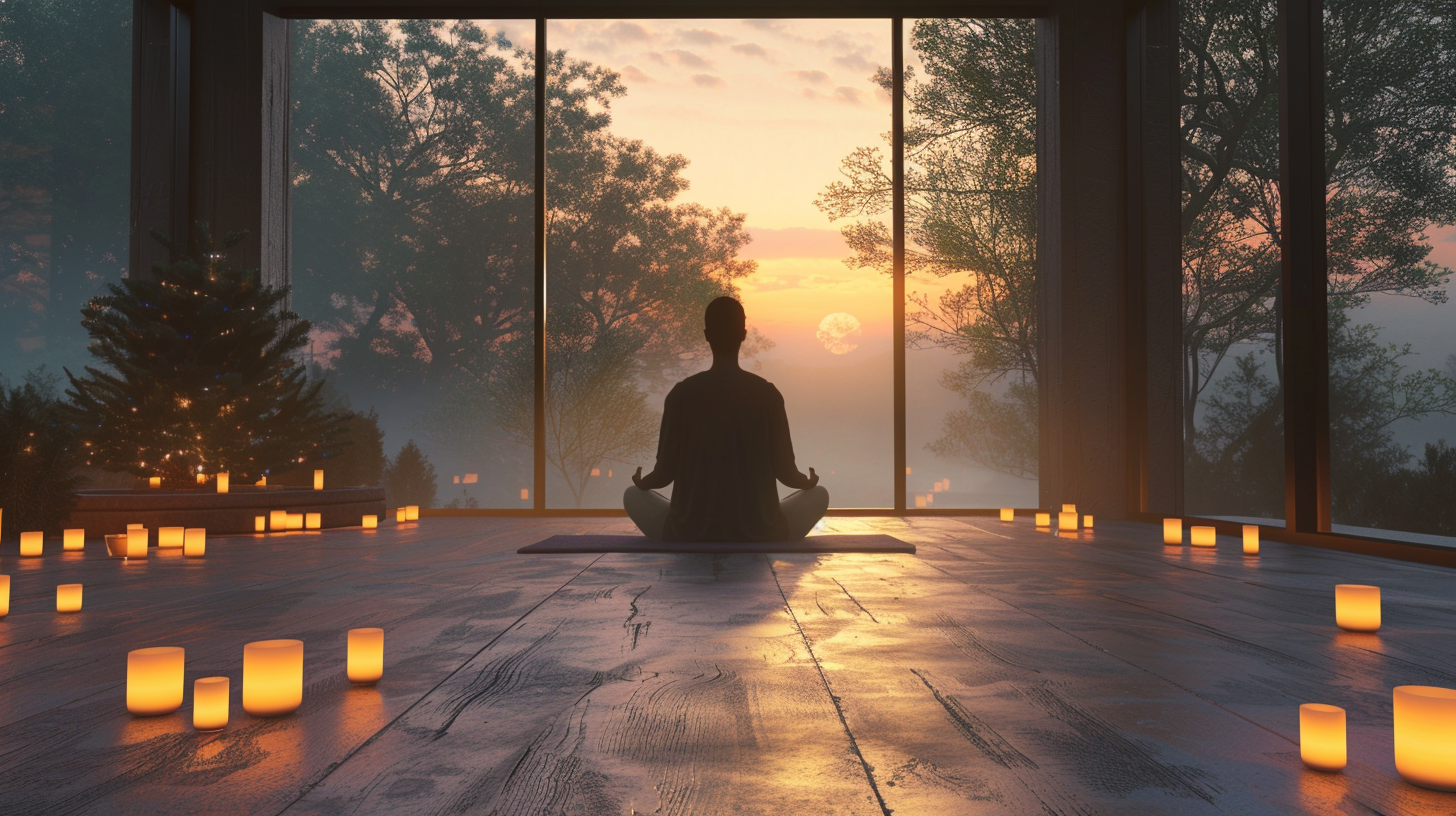Introduction: Embracing a Holistic Journey

Three years ago, Emily stood at a crossroads that many of us might find familiar. Despite a successful career and a bustling social life, an unshakeable feeling of emptiness lingered. Sleepless nights, anxiety, and a chronic sense of fatigue had become her norm. Traditional visits to her doctor had left her with a collection of prescriptions but no real relief. It was only after a friend’s gentle nudge that Emily ventured into a workshop titled “The Holistic Path to Wellness,” a decision that would profoundly alter her approach to mental health and personal growth.
Emily’s initial skepticism was not unique; the holistic model of health often seems at odds with the quick fixes modern life tempts us with. The workshop introduced her to the interconnectedness of physical, mental, emotional, and spiritual well-being—a concept that resonated deeply within her. As she delved deeper, Emily adopted a range of holistic practices. She started with meditation and yoga, fostering a newfound sense of calm and strength in her body. Nutrition came next, where a plant-based diet rich in nutrients began to replace her hurried, caffeine-fueled meals. But it was the emotional and spiritual counseling sessions that truly transformed her, allowing Emily to uncover and address the root causes of her distress.
Through these practices, Emily learned that her symptoms were not just random misfires in her body, but signs of deeper imbalances. Each holistic practice helped her weave a stronger, more resilient tapestry of health. As her sleep improved, so did her energy levels and her ability to handle stress. More importantly, these changes brought a clarity that transcended her physical symptoms, guiding her toward a more enlightened understanding of herself and her place in the world.
This journey of transformation is not just Emily’s story; it is the essence of the holistic approach to mental health. It teaches us that health is not merely the absence of disease but the harmonious balance of our entire being. By addressing not only the symptoms but the root causes of our distress, holistic practices foster a deep, compassionate self-awareness that is both healing and enlightening.
As we explore the dimensions of this approach throughout this guide, consider how these practices might resonate with your own experiences. The path to enlightenment begins with a step toward holistic health, one that invites you to explore the profound connection between your mind, body, and spirit. Emily’s story is a testament to the transformative power of this journey—a journey that awaits anyone willing to embrace its potential.
Understanding Holism in Mental Health

Holistic health is a philosophy that transcends the mere absence of disease to embrace the full spectrum of a person’s well-being. It is grounded in the integration of physical, mental, emotional, and spiritual health, recognizing that these dimensions are profoundly interconnected. Each aspect of our health influences the others, contributing to our overall state of well-being. By nurturing each part, we foster a balanced, healthy whole.
The principles of holistic health focus on the entire human experience. This approach considers not just the physical symptoms but the emotional and spiritual contexts that shape our health. It emphasizes preventive care, lifestyle changes, and self-care practices, alongside the use of natural and therapeutic interventions. The goal is to achieve optimal health by aligning the body, mind, and spirit in harmony.
In contrast, conventional treatments often prioritize symptom management over underlying causes. While traditional medicine is essential, especially in acute and emergency care, it sometimes falls short in addressing chronic ailments and mental health issues. This is where holistic practices shine, as they strive to uncover and treat the root causes of illness rather than just alleviating symptoms. For example, where conventional medicine might prescribe medication to treat anxiety, holistic health explores stress management techniques, dietary adjustments, and spiritual practices that address the source of anxiety.
The benefits of a holistic approach are manifold. It not only enhances long-term wellness but also prevents future health issues by maintaining an equilibrium in life forces. Individuals who embrace holistic practices often report a deeper sense of self-awareness and fulfillment, as they are actively engaged in their healing process. For instance, consider the story from our introduction—Emily, who found profound relief and enlightenment through holistic practices after conventional methods left her wanting.
To bring these concepts to life, let’s examine a brief case study: John, a 45-year-old office worker, suffered from chronic headaches and stress. Traditional approaches provided temporary relief but did not address his underlying issues. Through holistic practices such as mindfulness meditation, dietary changes, and regular physical activity, John experienced a significant reduction in his symptoms and, more importantly, a greater sense of control over his health and life.
As we continue to explore specific holistic practices in the subsequent sections, consider how integrating these approaches could benefit not just your mental health but your overall quality of life. Holistic health invites you to become an active participant in your journey towards wellness, promising a more attuned and fulfilled existence.
Core Components of a Holistic Mental Health Strategy

Mindful Practices
Mindfulness, meditation, and yoga are cornerstones of holistic mental health, each offering a pathway to tranquility and heightened awareness. Here’s how you can begin integrating these practices into your daily routine:
Meditation: Start with just five minutes a day. Sit in a quiet place, close your eyes, and focus on your breath. As thoughts arise, acknowledge them and let them go, returning your focus to your breathing. Over time, gradually increase the duration of your sessions.
Yoga: Join a beginner class or follow an online tutorial. Focus on the connection between movement and breath. Yoga combines physical postures, breathing exercises, and meditation to enhance physical flexibility and mental clarity.
Mindfulness: Practice mindfulness during routine activities such as eating or walking. Pay close attention to the sensations, textures, and flavors. This awareness brings a profound appreciation of the moment and reduces stress.
Benefits: Research shows that these practices decrease stress and anxiety, enhance concentration, and improve emotional resilience. Regular engagement in these activities can lead to significant improvements in overall mental health and well-being.
Nutrition and Physical Health
The connection between the body and mind is pivotal in holistic health:
Nutrition: Opt for a diet rich in vegetables, fruits, whole grains, and lean proteins. Foods high in omega-3 fatty acids, like salmon and flaxseeds, are known to enhance brain function and mood. Limit the intake of processed foods and sugars, which can lead to energy crashes and mood swings.
Exercise: Incorporate regular physical activity into your routine. Activities like walking, cycling, or swimming stimulate the production of endorphins, the body’s natural mood lifters. Aim for at least 30 minutes of moderate exercise most days of the week.
Impact: Studies consistently find that a balanced diet and regular physical activity can improve cognitive functions and emotional health, mitigating symptoms of depression and anxiety.
Emotional Well-being
Developing emotional intelligence is crucial for managing stress and fostering healthy relationships:
Journaling: Start by writing a few minutes each day about your feelings and experiences. This practice can help you process emotions and reflect on your day-to-day life.
Cognitive Behavioral Techniques: Learn to identify and challenge negative thought patterns. Replace them with more positive and realistic ones to shift your mindset and reduce emotional distress.
Emotional Literacy Exercises: Practice recognizing and naming your emotions as they arise. This awareness can help you understand and manage your feelings more effectively.
Integration: These techniques empower you to take control of your emotions, leading to greater emotional stability and resilience.
Spiritual Practices and Enlightenment

Spirituality and enlightenment play a pivotal role in holistic mental health, offering pathways that extend beyond the physical into the realms of the ethereal and profound. This section delves into the diverse spiritual traditions that aim to foster personal growth and deeper self-understanding, which are integral to holistic well-being.
Exploring Spirituality Across Cultures
Buddhism: Central to Buddhist practice is meditation, a technique that promotes mindfulness and awareness. Techniques such as Vipassana (insight meditation) and Zazen (seated meditation) are designed to help practitioners experience a state of serene awareness and detachment from transient thoughts, leading towards enlightenment.
Hinduism: Yoga, more than just physical exercise, is a spiritual practice in Hindu culture that unites the body, mind, and spirit. Beyond physical poses (asanas), yoga includes pranayama (breath control) and dhyana (meditation), fostering a discipline that can lead to spiritual awakening.
Christianity: Contemplative prayer and meditation in Christian traditions involve focusing on a spiritual word or phrase, sometimes silently, to feel a closer connection to God and the divine presence. This practice emphasizes inner silence and communion with the divine rather than vocal prayer.
Each of these practices shares a common goal: to transcend the everyday experience and tap into a deeper, more profound state of being, enhancing both personal and spiritual growth.
Practical Tools for Spiritual Growth
The journey towards spiritual enlightenment can be supported by a variety of modern tools and techniques:
Modern Meditation Techniques: Guided meditations, whether through classes or digital apps, offer accessible ways for individuals to start or deepen their meditation practice. These resources often provide structured paths from beginner to advanced levels, accommodating all stages of a spiritual journey.
Spiritual Retreats: Participating in retreats offers a dedicated time and space for deeper spiritual exploration and disconnect from daily stressors. These can vary from silent retreats to more interactive workshops, all designed to foster deeper spiritual connections and personal insight.
Workshops and Seminars: These gatherings provide education on various spiritual practices and theories, creating a community of learners and practitioners who support and motivate each other on their spiritual paths.
Digital Apps: Apps like Headspace or Calm offer daily meditation exercises, progress tracking, and community features that help build and sustain a regular spiritual practice. These tools make spiritual practices more accessible and integrate easily into daily life.
Illuminated Paths: Sadhguru's Journey to Enlightenment at TED Talks
Integrating Community and Support Systems

Community and support systems are fundamental to a holistic approach to mental health, providing a network of shared experiences and mutual assistance that enhances both individual and collective well-being.
The Role of Community in Holistic Health
In holistic health, community is not just a backdrop but a dynamic participant in the healing and growing process. Being part of a community helps individuals feel less isolated in their struggles and more supported in their journey towards health and enlightenment. It provides a sense of belonging and connection that is often missing in our fast-paced, individualistic society. Shared values and common goals make these communities powerful allies in the quest for better health.
Online Forums
Online forums have become vital in spreading and supporting holistic health practices. Platforms like HealthUnlocked or the Wellness Community offer spaces where individuals from all over the world share their experiences, seek advice, and find encouragement. Users can find threads ranging from beginner yoga tips to advanced meditation techniques, all guided by the principle of mutual respect and support. These forums are easily accessible and provide a wealth of knowledge and experience that can guide newcomers and seasoned practitioners alike.
Local Groups
Local groups add a personal touch to the holistic practice. Participating in local yoga classes, meditation circles, or holistic health workshops allows individuals to experience the energy and motivation that come from group practice. These gatherings are not just about learning new skills but also about experiencing collective healing and finding personal connections in physical spaces. The shared experience of breathing, moving, and growing together fosters a unique bond that can be profoundly supportive.
Therapy Options
Integrating traditional and holistic therapies provides a comprehensive approach to mental health. Many therapists now recognize the benefits of combining methods like cognitive behavioral therapy with mindfulness-based stress reduction or yoga. This blend of traditional and holistic approaches helps address both the symptoms and the underlying causes of mental distress. Therapists often encourage their clients to engage with community resources and practices, enhancing the therapeutic journey with supportive group experiences.
Holistic Tools and Technologies
In the evolving landscape of health and wellness, cutting-edge digital tools and technologies are playing a pivotal role in transforming traditional approaches to holistic mental health. These innovations provide new avenues for individuals to enhance their well-being across physical, mental, emotional, and spiritual domains.
The Integration of Digital Tools in Holistic Health
Mobile Health Apps: Apps like Headspace and MyFitnessPal have revolutionized how individuals manage their mental and physical health. Headspace offers guided meditations that help users cultivate mindfulness and reduce stress, while MyFitnessPal allows users to track their dietary habits and physical activity, promoting an integrated approach to health that encompasses nutritional and physical wellness.
Wearable Devices: Devices such as the Fitbit and Apple Watch go beyond simple activity tracking. They monitor sleep patterns, heart rate variability, and even stress levels, providing a holistic view of one’s health. This continuous monitoring allows users to make informed decisions about their daily habits and interventions needed to maintain or improve their health status.
Virtual Reality (VR): VR technologies are increasingly used for more than just entertainment. For example, VR applications designed for anxiety management place users in peaceful, controlled environments, helping them practice relaxation techniques and mindfulness in settings that encourage calmness.
Artificial Intelligence (AI): AI plays a crucial role in personalizing health interventions. By analyzing data collected from apps and wearables, AI can offer tailored recommendations, predict health trends, and even suggest behavioral modifications. This personalized approach enhances the effectiveness of holistic health practices by aligning them more closely with individual needs.
In the innovative realm of holistic mental health tools, virtual reality (VR) stands out for its profound impact on traditional therapy methods, especially in treating conditions like social anxiety. A compelling example of VR’s effectiveness is found in the work done at the Columbia University Clinic for Anxiety and Related Disorders (CUCARD). Here, psychologists have developed a specialized VR therapy program that targets teens and young adults struggling with social anxiety disorder (SAD).
Virtual Reality: A New Frontier in Anxiety Therapy
At CUCARD, the use of VR enables patients to confront anxiety-inducing social situations in a controlled, virtual environment. This innovative approach utilizes realistic 3-D simulations where users can practice social interactions—such as speaking in public or mingling at parties—without the real-world stakes. This method is particularly suitable for young individuals who might be more accustomed to digital interfaces and video games.
Dr. Lauren Hoffman, an assistant professor of medical psychology at Columbia, spearheads this program, emphasizing the tailored nature of VR therapy. The technology allows therapists to adjust scenarios in real-time, increasing or decreasing the level of challenge based on the patient’s response. For example, a virtual party scene can be manipulated to include more people or unexpected social interactions, providing gradual exposure and helping patients build coping skills incrementally.
The Impact of VR on Social Anxiety
The case of Emma, a young adult participating in CUCARD’s VR program, highlights the practical benefits of this technology. Emma, who had struggled with severe social anxiety throughout her teens, found traditional exposure therapies overwhelming and often unmanageable. The introduction of VR into her therapy was transformative. In the VR setting, Emma could repeatedly practice social skills and face her fears without the immediate pressure of real-life consequences. Over time, these virtual interactions helped decrease her anxiety and significantly improved her ability to engage in real-world social situations.
Emma’s progress underscores the potential of VR to not only simulate real-life experiences but also to create a safe space for exposure therapy. This controlled environment is pivotal for patients like Emma, who need to experience and manage their fears gradually. Her success story exemplifies how VR can be seamlessly integrated into therapeutic practices, enhancing traditional methods and offering a bridge to real-life competency and confidence.
Overcoming Challenges and Barriers
Embarking on a holistic health journey presents unique challenges, particularly when confronted with cultural stigmas and the quest for reliable information. This section explores these obstacles and offers strategies to overcome them, ensuring a supportive path towards holistic mental health.
Addressing Cultural Stigma
Cultural stigma often surrounds holistic health practices, largely due to misconceptions and a lack of understanding about non-conventional treatments. This stigma can deter individuals from exploring or embracing holistic methods, fearing judgment or disbelief from their peers and community.
Strategies to Educate and Overcome Stigma
Educational Workshops and Seminars: Participating in or organizing workshops and seminars can be an effective way to educate yourself and others. These platforms provide an opportunity to learn from experts and can help demystify holistic practices, making them more acceptable and understood within the community.
Reliable Online Platforms: Encourage the use of reputable online platforms that offer educational articles, videos, and courses on holistic health. Websites like the National Center for Complementary and Integrative Health provide resources that are both accessible and authoritative.
Finding Credible Resources
The abundance of information available can make it difficult to discern what is credible, especially in a field rife with misinformation.
How to Identify and Evaluate Credible Sources
Check Qualifications and Reviews: Always look for qualifications and peer reviews when consulting health information. Trusted sources often have credentials listed and are reviewed or referenced by other professionals in the field.
Recommended Resources: Direct readers to established health websites, books authored by experts with notable credentials, and peer-reviewed journals. Websites such as Healthline or academic institutions often have sections dedicated to holistic health supported by scientific research.
Building Community Support
Community plays a vital role in overcoming the stigma associated with holistic health practices.
Enhancing Support Through Community
Join Local or Online Groups: Engaging with groups that share an interest in holistic health can provide essential support. These groups offer a platform to share experiences, gain knowledge, and validate personal health choices in a supportive environment.
Participate in Forums and Social Media: Platforms like Reddit or specific Facebook groups focused on holistic practices can offer support and a sense of belonging, helping individuals feel less isolated in their health journey.
Seeking Professional Guidance
Consulting with healthcare professionals who specialize in holistic medicine is crucial to ensure safe and effective practice.
Leveraging Expertise in Holistic Health
Consult Holistic Health Practitioners: Professionals in holistic health can provide personalized guidance based on an individual’s specific health needs, ensuring that the practices adopted are beneficial.
Integrative Health Centers: Many healthcare facilities now offer integrative approaches that combine traditional and holistic medicine, providing a comprehensive treatment plan that addresses various aspects of an individual’s health.
Future Directions in Holistic Mental Health
The field of holistic mental health is undergoing rapid evolution, with cutting-edge innovations and global shifts redefining what it means to achieve wellness. As we venture into this evolving landscape, the integration of artificial intelligence (AI) and emerging therapies offers exciting possibilities for personalized health strategies and deeper healing.
AI in Personalized Health Strategies
Artificial intelligence is revolutionizing the way we approach mental health. AI technologies are increasingly being employed to tailor wellness programs to individual needs, enhancing the effectiveness of treatments across the spectrum of mental health and spiritual practices. For instance, AI-driven apps can analyze user input to suggest personalized meditation or yoga routines, adjust diet plans, or modify sleep schedules—all aimed at optimizing mental well-being.
Emerging Therapies in Holistic Health
In the realm of emerging therapies, techniques like neurofeedback, biophilic design, and controlled use of psychedelics are gaining traction. Neurofeedback trains individuals to alter their brain activity, fostering better mental health through enhanced self-regulation. Biophilic design incorporates natural elements into living spaces, which has been shown to reduce stress and improve mood and cognitive function. Meanwhile, the controlled use of psychedelics in therapeutic settings is being explored for its potential to treat a wide range of mental health issues by promoting profound psychological insights and emotional release.
Global Shift Towards Holistic Approaches
Globally, there is a noticeable shift towards integrating traditional healing practices with modern medicine, reflecting a more holistic approach to health. This integration is supported by global health organizations and significant policy shifts, indicating a broader acceptance and institutional recognition of holistic methods. These practices, which combine centuries-old wisdom with contemporary scientific understanding, are helping to bridge cultural divides and bring diverse healing modalities to the forefront of global health strategies.
Expert Opinions on Holistic Health
Experts in psychology, wellness, and spirituality are advocating for these holistic methods, emphasizing their benefits and the challenges in achieving broader acceptance. Leaders in the field share their visions for the future, which include more inclusive and comprehensive approaches to health that encompass the full spectrum of human experience—from the physical to the metaphysical.
Real-World Impact and Future Potential
These advancements are not just theoretical but are making tangible impacts worldwide. For instance, a wellness center in Europe successfully integrates AI with traditional wellness therapies, providing customized treatment plans that have significantly improved patient outcomes. Such examples illustrate the powerful potential of these innovations to transform holistic mental health care.
Conclusion: Your Path to Holistic Health and Enlightenment

As we conclude our exploration of “The Holistic Path: A Comprehensive Guide to Mental Health and Enlightenment,” let us revisit the profound benefits of embracing a holistic approach to health. Throughout this guide, we’ve seen how integrating physical, mental, emotional, and spiritual well-being can significantly enhance our overall health. These practices do more than alleviate symptoms; they foster a deep, introspective connection with ourselves, paving the way for true enlightenment.
Now, I encourage you to take the first steps on your journey toward holistic health. Start small—perhaps with daily meditation, mindful walking, or by joining a community wellness group. These initial steps are designed to integrate seamlessly into your daily routine, ensuring a sustainable and enjoyable enhancement to your lifestyle.
Imagine the transformative power of these simple practices. Consider the story of Sarah, who began her holistic journey with morning yoga and found not only physical relief but a newfound peace that enriched every aspect of her life. Let her story inspire you to embark on your own path.
As you move forward, remember that this is not merely a journey to a destination but a continuous path of learning and personal growth. View each step as part of a lifelong adventure in self-discovery and self-improvement. Embrace the holistic approach not just as a treatment but as a lifestyle—one that continuously evolves and adapts to your growing needs and insights.
By taking these steps today, you are not just seeking temporary solutions but are committing to a more fulfilled and enlightened existence. Let this guide be your starting point, and let your curiosity and desire for well-being lead you to deeper discoveries and greater health. Here’s to your health, happiness, and holistic journey—may it be as rewarding as it is enlightening.







